Understanding Organic Herbs for Tea: Benefits and Uses
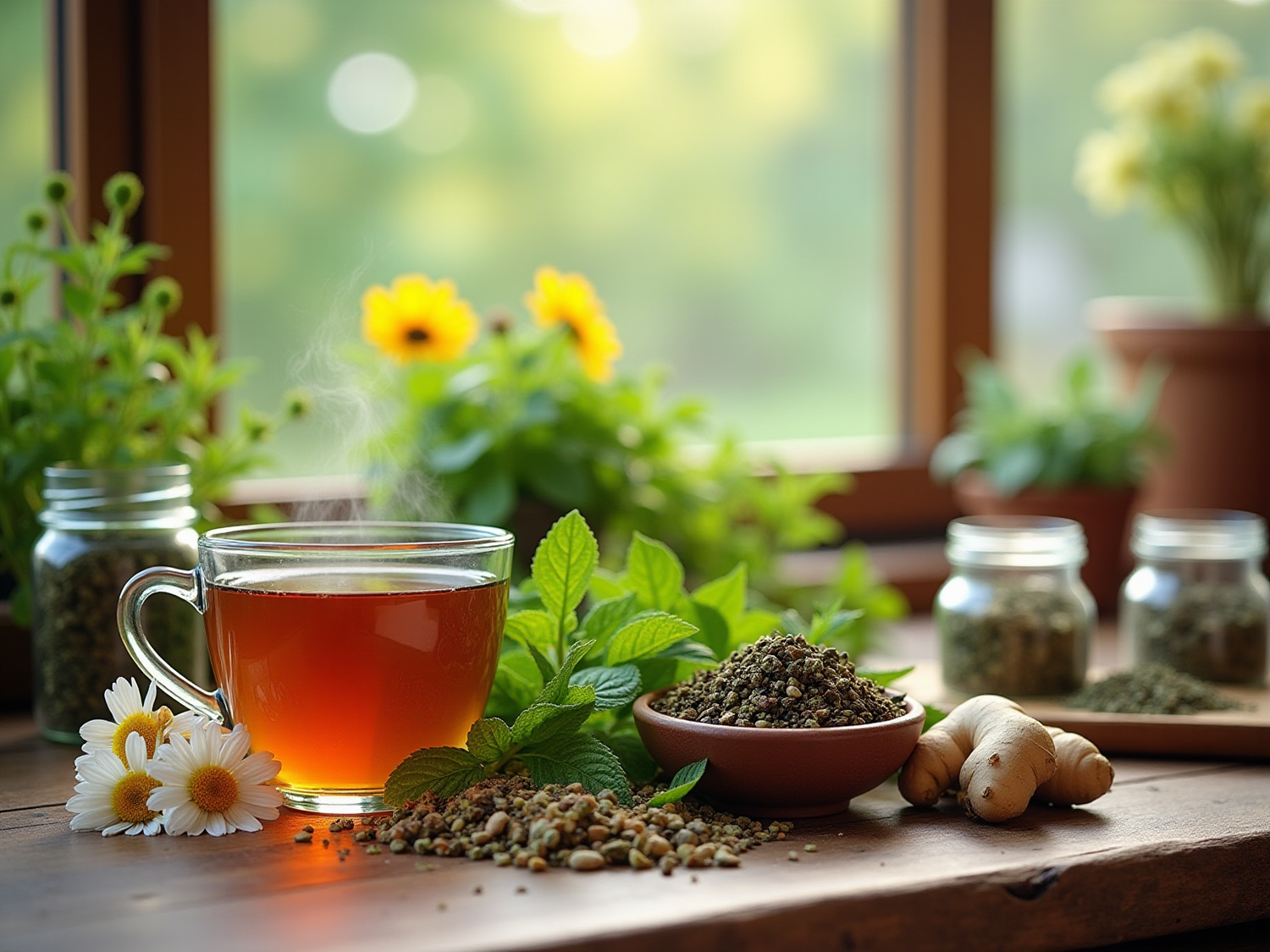
Overview
Organic herbs for tea offer a wealth of health benefits, and their sustainable cultivation without harmful chemicals makes them a beloved choice for those who prioritize their well-being. Imagine sipping a warm cup of tea that not only tastes delightful but also nurtures your body and mind. These herbs enhance flavor while providing therapeutic properties, such as promoting relaxation and aiding digestion. As a result, they support overall wellness and align beautifully with the growing demand for natural health solutions.
In addition to their rich flavors, these organic herbs invite you to embark on a journey towards better health. Picture yourself unwinding after a long day, cradling a cup of herbal tea that soothes your senses and calms your mind. With every sip, you’re not just enjoying a beverage; you’re embracing a holistic approach to wellness.
Moreover, the commitment to quality and sustainability in growing these herbs reflects a heartfelt dedication to your health. By choosing organic, you’re not only caring for yourself but also supporting practices that are gentle on the earth. So why not explore the world of organic herbal teas? Your wellness journey deserves this nurturing touch.
Introduction
In a world increasingly attuned to health and sustainability, the allure of organic herbs for tea is stronger than ever. These natural ingredients, cultivated without synthetic chemicals, promise not only a purer flavor but also a wealth of wellness benefits that resonate with tea enthusiasts and health-conscious consumers alike. As the organic movement continues to gain momentum, understanding the significance of these herbs—rooted in ancient traditions and modern practices—becomes essential.
Imagine enhancing your relaxation or supporting your digestion with every sip. The journey through the rich history and health advantages of organic herbal teas reveals a compelling narrative that invites exploration and appreciation. Discover how these time-honored ingredients can transform a simple cup of tea into a powerful ally for your well-being. What if your next cup could be a step towards a healthier, more vibrant you?
Defining Organic Herbs for Tea: What They Are and Why They Matter
Organic herbs for tea are grown without artificial pesticides, weed killers, or fertilizers, following strict natural farming standards that emphasize environmental sustainability and consumer well-being. The importance of organic herbs for tea lies in their purity, free from harmful chemicals, making them an excellent choice for tea enthusiasts. Moreover, organic herbs for tea typically offer enhanced flavor characteristics and higher levels of beneficial substances, contributing to the health advantages associated with herbal infusions. At Gardenika, we believe that every cup of tea made with organic herbs for tea should not only taste delightful but also embody the highest standards of purity and sustainability. Our USDA Organic Certified and KSA Kosher Certified teas guarantee that you are selecting products that meet stringent quality standards. Additionally, every batch undergoes third-party lab testing for safety and quality, allowing you to trust that each sip is pure and reliable.
As the natural food market continues to flourish—driven by a growing preference for pure and nutritious options—shoppers are increasingly seeking choices that enhance wellness and vitality. This trend is underscored by the rapid expansion of India's fresh greens market, the fastest-growing in the Asia-Pacific region, indicating a broader shift towards natural products globally, particularly organic herbs for tea, which provide benefits that extend beyond flavor by promoting health, aiding digestion, encouraging relaxation, and enhancing overall wellness. Gardenika's natural loose leaf teas, crafted with traditional plants, offer balance and wellness in your life, providing relaxation and immune support in every sip.
However, it’s essential to acknowledge the challenges in natural farming, such as lower yields and higher labor costs, which can influence the availability of these plants. With the natural market anticipated to grow substantially in the coming years, the importance of natural plants in enhancing tea quality and health benefits cannot be overstated. By choosing organic herbs for tea, consumers not only relish superior flavor but also support sustainable farming practices that positively impact the environment. Why not explore our offerings today? Shop Now!
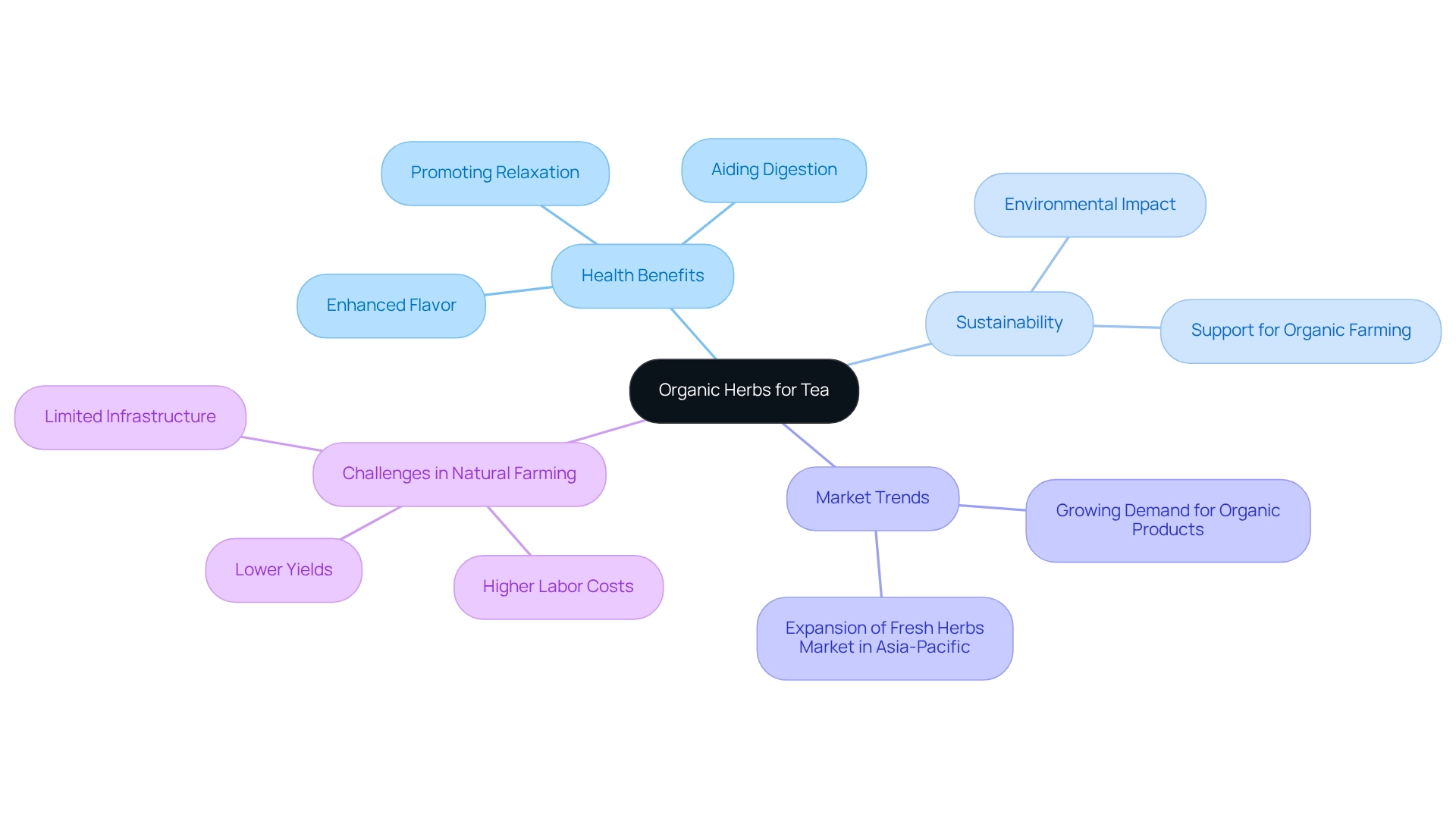
Historical Context: The Origins and Evolution of Organic Herbs in Tea
The use of organic herbs for tea has a rich history that spans thousands of years. Ancient civilizations like the Egyptians and Chinese harnessed herbal infusions for their medicinal benefits, creating a legacy that continues to thrive today. The Shang dynasty in China (circa 1600-1046 BCE) is often recognized for the earliest documented use of herbal teas, showcasing a deep-rooted tradition that has influenced various cultures over time. As herbal tea practices developed, they became essential to the health and wellness rituals of communities worldwide, each contributing unique knowledge and techniques.
In recent years, the contemporary natural movement has rekindled interest in these traditional practices. This shift emphasizes natural cultivation methods that honor both health and environmental sustainability. As a result, there is a growing consumer demand for organic herbs for tea options. Projections indicate that the US market for organic herbs for tea will surpass $1 billion in sales by 2027, reflecting a broader trend towards environmentally friendly practices and a preference for unique, health-focused teas. Historically, organic herbs for tea have served not only as beverages but also as remedies for various ailments. For instance, blends featuring turmeric and ginger—both time-tested plants—are celebrated for their anti-inflammatory properties. This illustrates how specific plants were valued for their health benefits. As communities have advanced, the understanding and use of organic herbs for tea have evolved, resulting in a rich tapestry of botanical knowledge that continues to influence modern practices.
Today, many buyers are increasingly drawn to herbal infusions made from organic herbs for tea, like those offered by Gardenika, which respect these ancient customs while promoting wellness and harmony in everyday life. These Ayurvedic blends provide natural solutions for relaxation and immune support, resonating with health-conscious consumers seeking holistic wellness. Why not explore our range of natural loose leaf infusions? Discover the advantages of these traditional plants and embrace a healthier lifestyle today.
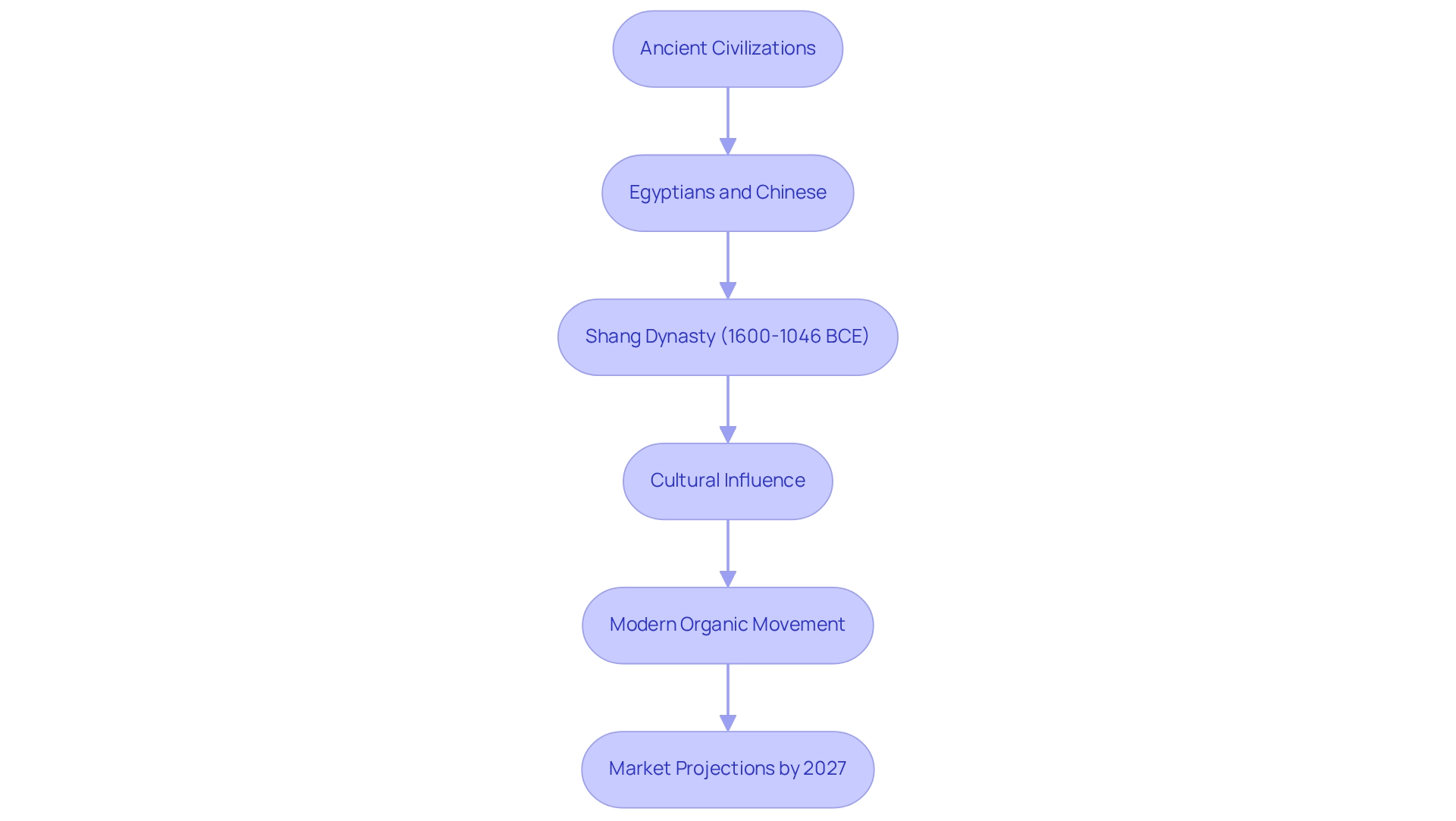
Health Benefits of Organic Herbs: Enhancing Wellness Through Tea
Natural plants, especially organic herbs for tea, are celebrated for their remarkable wellness advantages. Gardenika's premium organic loose leaf teas, crafted with time-honored herbs, can bring balance and wellness into your life. Chamomile, for instance, is widely cherished for its calming effects, promoting relaxation and aiding sleep. On the other hand, peppermint is appreciated for its digestive benefits, helping to ease discomfort and enhance digestive well-being.
The inclusion of ginger and turmeric in Gardenika's herbal blends is particularly noteworthy due to their powerful anti-inflammatory properties, which can help alleviate various forms of discomfort and support holistic health. Imagine sipping a warm cup of tea that not only comforts you but also nurtures your body from within.
Studies suggest that the polyphenols found in tea may play a protective role against oxidative stress and chronic inflammation, highlighting the importance of these plants in wellness practices. A case study titled "Role of Tea in Chronic Inflammation and Oxidative Stress" reviewed various studies exploring the relationship between tea consumption and inflammatory markers. While the results are mixed, it suggests that tea polyphenols may offer protective effects against oxidative stress-related conditions, indicating the potential of these natural remedies.
Many natural plants are also rich in antioxidants, essential for combating oxidative stress and enhancing immune function. The cumulative benefits of these organic herbs for tea underscore the importance of choosing high-quality ingredients. Not only do they elevate flavor, but they also significantly contribute to your overall wellness. Research shows that moderate intake of herbal infusions can lead to improved relaxation and digestive well-being, making them a wonderful choice for those who prioritize their health. If you have medical concerns, it's wise to enjoy herbal infusions in moderation.
To fully experience the benefits of Gardenika's herbal teas, steep one teaspoon of loose leaf tea in hot water for 5-7 minutes. This allows the flavors and wellness benefits to infuse thoroughly. By incorporating these organic herbs for tea into your daily routine, you can embrace a natural and effective way to support your wellness journey, aligning with the growing demand for natural health solutions. Gardenika's herbal infusions are not just a delightful addition to your lifestyle; they also offer numerous advantages for your well-being.
While herbal infusions are generally safe, it's always a good idea to consult with healthcare professionals regarding potential allergies or drug interactions. Why not take a moment to explore our blends and enhance your wellness journey today?
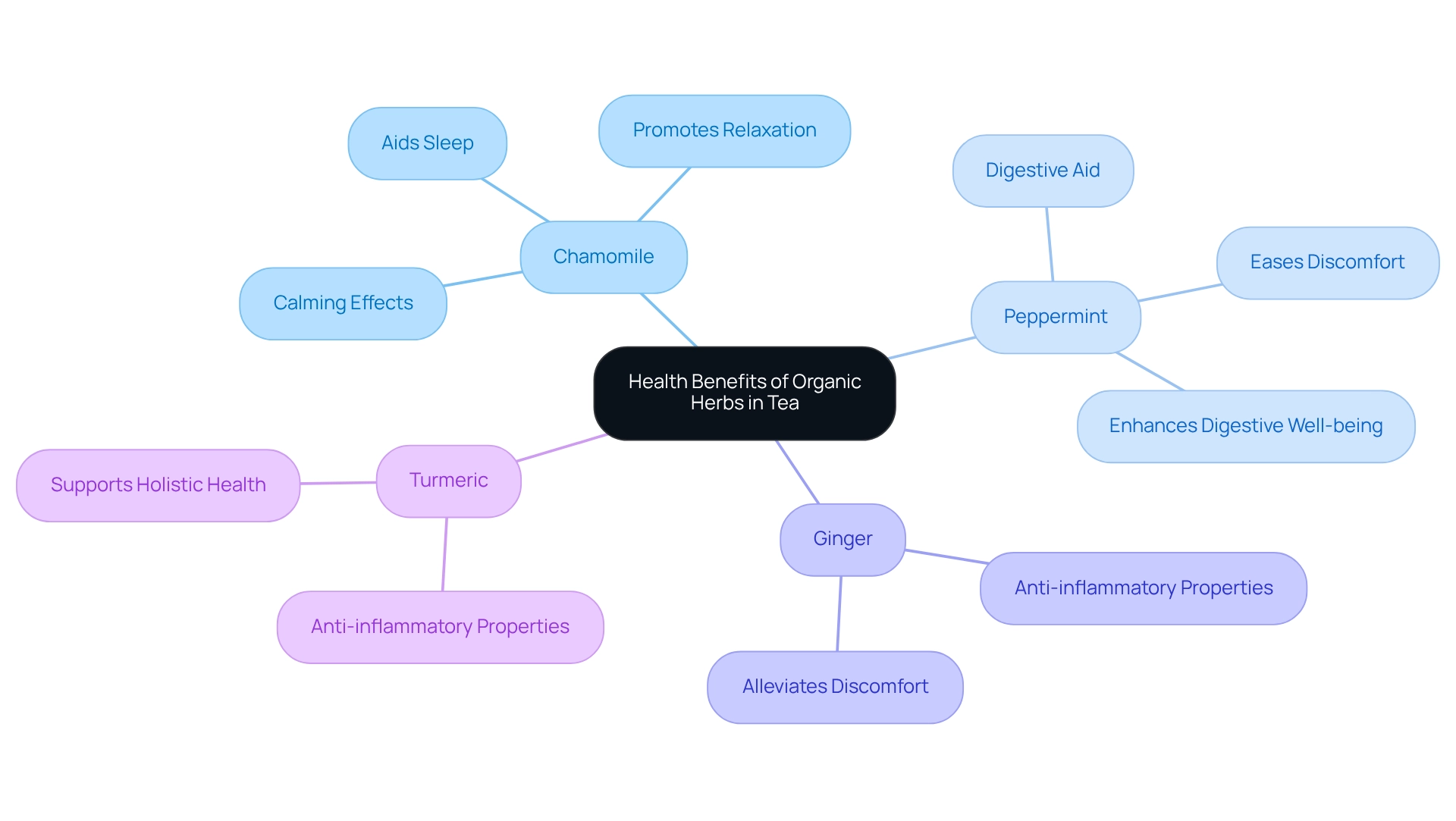
Practical Applications: How to Use Organic Herbs in Tea Blends
Creating botanical tea mixtures with organic herbs for tea is a delightful blend of creativity and science, especially when using Gardenika's organic loose leaf teas. Begin your journey by selecting a base plant, like chamomile or peppermint, which will serve as the primary flavor foundation. To enhance your blend's effects, consider incorporating complementary plants; for instance, pairing ginger with lemon balm can yield a soothing digestive infusion that supports your body's natural processes. A helpful guideline is to use about one tablespoon of dried plants per 8 ounces of water, steeping for 5 to 10 minutes to fully extract their flavors and benefits.
Experimentation is key—explore various combinations to uncover unique flavors and wellness benefits. For example, a blend of hibiscus and rose hips can create a refreshing and antioxidant-rich tea, while mixing lavender and chamomile promotes relaxation and immune support. Also, consider the seasonality of herbs; fresh herbs often offer more vibrant flavors and enhanced nutritional benefits compared to their dried counterparts. This hands-on approach not only enriches your tea-drinking experience but also empowers you to customize your blends according to your specific health needs.
With the liquid herbal tea segment poised for rapid growth due to the rising demand for ready-to-drink and functional beverage solutions, these practices align beautifully with the increasing interest in organic herbs for tea that promote energy and overall well-being. As Ralph Waldo Emerson once said, "There is a great deal of poetry and fine sentiment in a chest of tea." This sentiment resonates deeply with the experience of crafting personalized blends that cater to your wellness goals. Moreover, with over 2000 five-star reviews, Gardenika has cultivated a loyal customer base that appreciates the effectiveness and taste of its USDA Organic and Kosher certified products, underscoring the importance of quality in herbal tea blends.
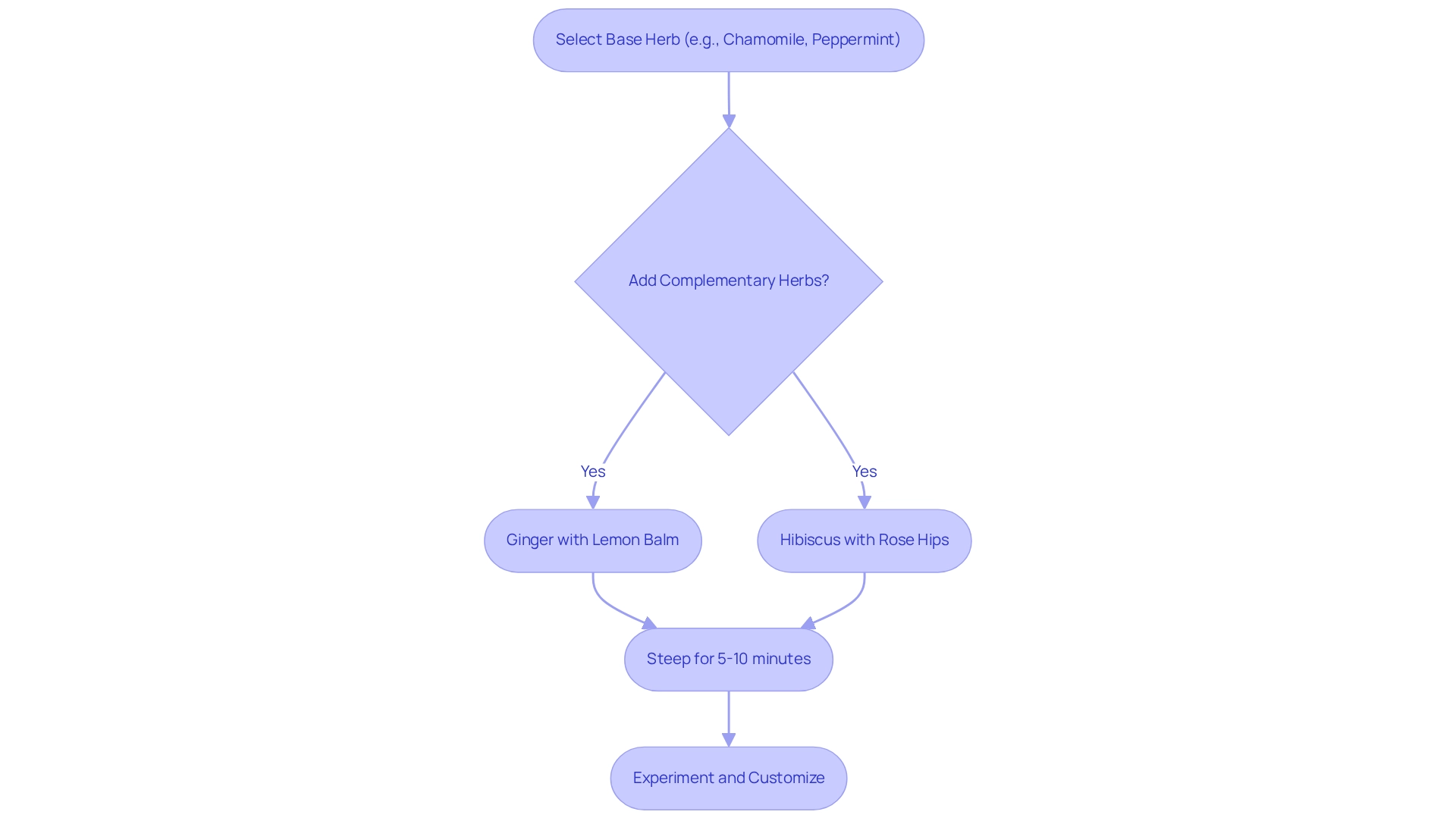
Conclusion
Exploring organic herbs for tea unveils a rich tapestry of history, health benefits, and practical applications that resonate deeply with today’s health-conscious consumers. By understanding the significance of organic herbs, cultivated without harmful chemicals, you can truly appreciate the enhanced flavor and wellness benefits these products offer. This commitment to purity and sustainability not only elevates the tea-drinking experience but also supports environmentally friendly practices that are essential for a healthier planet.
Historically, herbal teas have been cherished for thousands of years, and this ancient wisdom continues to guide modern practices. As the organic movement gains momentum, the demand for these time-honored ingredients grows, reflecting a broader trend towards natural health solutions. The health benefits derived from organic herbs—such as relaxation, improved digestion, and anti-inflammatory properties—highlight their role as powerful allies in your wellness routine.
Crafting unique herbal blends with organic ingredients allows you to personalize your tea experience, fostering both creativity and health. With the rising interest in functional beverages, the potential for organic herbal teas to enhance well-being is immense. Choosing high-quality, organic options not only enriches flavor but also contributes to a sustainable future.
Ultimately, embracing organic herbs for tea is more than just a choice; it represents a heartfelt commitment to health, sustainability, and the appreciation of nature’s gifts. Each cup of organic herbal tea offers an opportunity to nourish your body and soul while celebrating the rich traditions that have shaped this beloved beverage. So, why not take a moment to explore the delightful world of organic herbal teas? You deserve to treat yourself to the goodness they provide.
Frequently Asked Questions
What are organic herbs for tea?
Organic herbs for tea are grown without artificial pesticides, weed killers, or fertilizers, adhering to strict natural farming standards that prioritize environmental sustainability and consumer well-being.
Why are organic herbs for tea considered important?
They are important due to their purity, being free from harmful chemicals, and they typically offer enhanced flavor characteristics and higher levels of beneficial substances, contributing to the health advantages associated with herbal infusions.
What certifications do Gardenika's organic herbs for tea have?
Gardenika's organic herbs for tea are USDA Organic Certified and KSA Kosher Certified, ensuring that they meet stringent quality standards.
How does Gardenika ensure the safety and quality of its teas?
Every batch of Gardenika's teas undergoes third-party lab testing for safety and quality, ensuring that each sip is pure and reliable.
What trends are influencing the demand for organic herbs for tea?
There is a growing preference for pure and nutritious options in the natural food market, which is reflected in the rapid expansion of India’s fresh greens market, indicating a broader shift towards natural products globally.
What health benefits do organic herbs for tea provide?
Organic herbs for tea promote health by aiding digestion, encouraging relaxation, and enhancing overall wellness.
What challenges are associated with natural farming of herbs for tea?
Challenges include lower yields and higher labor costs, which can affect the availability of organic herbs for tea.
How do consumers benefit from choosing organic herbs for tea?
By choosing organic herbs for tea, consumers enjoy superior flavor and support sustainable farming practices that positively impact the environment.




